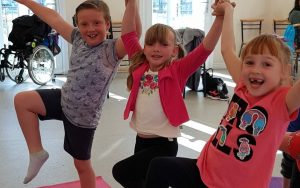Improve Attention Deficit Hyperactivity Disorder (ADHD) Symptoms in Children with Yoga
By John M. de Castro, Ph.D.
“research reports that yoga may help relieve attention-deficit hyperactivity disorder (ADHD) in children.” – Elaine Gavalas
Attention Deficit Hyperactivity Disorder (ADHD) is most commonly found in children, but for about half it persists into adulthood. It’s estimated that about 5% of the adult population has ADHD. Hence, this is a very large problem that can produce inattention, impulsivity, hyperactivity, and emotional issues, and reduce quality of life. The most common treatment is drugs, like methylphenidate, Ritalin, which helps reducing symptoms in about 30% of the people with ADHD. Unfortunately, the effectiveness of the drugs appears to be markedly reduced after the first year. In addition, the drugs often have troublesome side effects, can be addictive, and can readily be abused. So, drugs, at present, do not appear to be a good solution, only affecting some, only for a short time, and with unwanted side effects.
There are indications that mindfulness training may be an effective treatment for ADHD. It makes sense that it should be, as the skills and abilities strengthened by mindfulness training are identical to those that are defective in ADHD, attention, impulse control, executive function, emotion control, and mood improvement. In addition, unlike drugs, it is a relatively safe intervention that has minimal troublesome side effects. Yoga is both an exercise and a mindfulness practice. This could be particularly attractive for kids with ADHD.
In today’s Research News article “Effects of Yoga on Attention, Impulsivity, and Hyperactivity in Preschool-Aged Children with Attention-Deficit Hyperactivity Disorder Symptoms.” (See summary below or view the full text of the study at: https://www.ncbi.nlm.nih.gov/pmc/articles/PMC5871620/), Cohen and colleagues recruited preschool children (3-5 years of age) who had at least 4 symptoms of Attention Deficit Hyperactivity Disorder (ADHD). They were randomly assigned to either 6 weeks of Yoga practice or a wait-list control condition. Yoga practice consisted of breathing exercises and poses and occurred twice a week at school in a group setting for 30 minutes and on other days at home guided by a DVD. Before and after the intervention and 6 weeks and 3 months later the parents and teachers completed measures of the children’s ADHD symptoms, emotional symptoms, conduct problems, peer problems, hyperactivity/inattention and prosocial behaviors. The children were also directly measured for attention in a computer-based test and for heart rate variability.
They found that for children with high Attention Deficit Hyperactivity Disorder (ADHD) symptom scores, yoga practice produced significant reductions in inattention and hyperactivity/inattention ratings by the parents. On the attention task, after the yoga intervention the children had significantly improved attention but also significantly higher distractibility. These findings were maintained at follow-up.
The results suggest that yoga practice is particularly beneficial for children who are high in Attention Deficit Hyperactivity Disorder (ADHD) symptoms improving their attentional ability and hyperactivity. These findings require further investigation to look closer at students with lower ADHD scores. But, they suggest that yoga practice may be beneficial in treating ADHD in preschool children. Intervening this early in development may help to prevent ADHD development and/or prevent its transition into adulthood.
So, improve attention deficit hyperactivity disorder (ADHD) symptoms in children with yoga.
“Pairing a hyperactive child with a quiet, slow form of exercise may sound counterintuitive and even disastrous, but it turns out yoga can be incredibly helpful for children with attention deficit hyperactivity disorder (ADHD).” – Dennis Thompson
CMCS – Center for Mindfulness and Contemplative Studies
This and other Contemplative Studies posts are also available on Google+ https://plus.google.com/106784388191201299496/posts and on Twitter @MindfulResearch
Study Summary
Cohen, S., Harvey, D. J., Shields, R. H., Shields, G. S., Rashedi, R. N., Tancredi, D. J., … Schweitzer, J. B. (2018). Effects of Yoga on Attention, Impulsivity, and Hyperactivity in Preschool-Aged Children with Attention-Deficit Hyperactivity Disorder Symptoms. Journal of developmental and behavioral pediatrics : JDBP, 39(3), 200–209. doi:10.1097/DBP.0000000000000552
Abstract
Objective
Behavioral therapies are first line treatments for preschoolers with ADHD. Studies support yoga as an intervention for school age children with ADHD; this study evaluated the effects of yoga in preschoolers on parent and teacher rated attention/challenging behaviors; attentional control (KiTAP); and heart rate variability (HRV).
Methods
This randomized waitlist-controlled trial tested a 6-week yoga intervention in preschoolers with ≥ 4 ADHD symptoms on the ADHD Rating Scale-IV Preschool Version. Group 1 (n=12) practiced yoga first; Group 2 (n=11) practiced yoga second. We collected data at four time points: baseline, T1 (6 wk), T2 (12 wk), follow-up (3 mo after T2).
Results
At baseline, there were no significant differences between Group 1 and 2 on any measure. At T1, Group 1 had faster reaction times on the KiTAP Go/No go task (p=.01, 95% CI: −371.1, −59.1, d=−1.7), fewer Distractibility errors of omission (p=.009, 95% CI: −14.2, −2.3, d=−1.5), but more commission errors (p=.02, 95% CI:1.4, 14.8, d=1.3) than Group 2. Children in Group 1 with more severe symptoms at baseline showed improvement at T1 not seen in Group 2 on parent-rated Strengths and Difficulties Questionnaire hyperactivity-inattention (β=−2.1, p=.04, 95% CI: −4.0, −0.1) and inattention on the ADHD Rating Scale (β=−4.4, p=.02, 95% CI: −7.9, −0.9). HRV measures did not differ between groups.
Conclusions
Yoga was associated with modest improvements on an objective measure of attention (KiTAP) and selective improvements on parent ratings. Yoga may be a promising treatment for ADHD symptoms in preschoolers.
https://www.ncbi.nlm.nih.gov/pmc/articles/PMC5871620/
